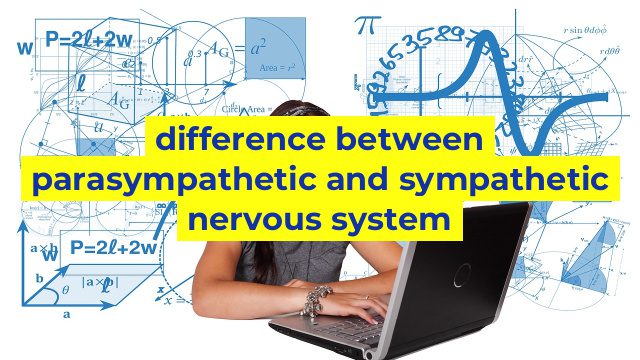The Difference Between Parasympathetic and Sympathetic Nervous System Explained
The nervous system is responsible for controlling and coordinating all body functions. This system is divided into two main parts, the parasympathetic and sympathetic nervous system. Both systems have different functions and work together to regulate and maintain the body’s homeostasis. In this article, we will explain the differences between the parasympathetic and sympathetic nervous system in more detail.
What is the Sympathetic Nervous System?
The sympathetic nervous system is known as the ‘fight or flight’ response. When the body perceives a threat or danger, the sympathetic nervous system is activated. It prepares the body to either fight the danger or run away from it. The sympathetic nervous system is responsible for several responses including increased heart rate, dilation of the pupils, and increased breathing rate. The system also decreases blood flow to non-essential organs like the digestive system, while increasing blood flow to essential organs like the brain, heart, and muscles.
What is the Parasympathetic Nervous System?
The parasympathetic nervous system is responsible for the ‘rest and digest’ response. It helps the body to conserve energy and to promote digestion after a meal. Unlike the sympathetic nervous system, the parasympathetic nervous system slows down heart rate, constricts pupils, and decreases breathing rates. The system also increases blood flow to the digestive system, allowing for proper digestion and absorption of nutrients.
Key Differences Between Parasympathetic and Sympathetic Nervous System
The main differences between these two systems are:
1. Activation – The sympathetic nervous system is activated in response to stressors, while the parasympathetic nervous system is activated during times of rest.
2. Response – The sympathetic nervous system prepares the body for action, while the parasympathetic nervous system promotes relaxation.
3. Heart rate – The sympathetic nervous system increases heart rate, while the parasympathetic nervous system slows down heart rate.
4. Digestion – The sympathetic nervous system slows down digestion to conserve energy, while the parasympathetic nervous system promotes digestion.
Conclusion
The nervous system is complex, and both the parasympathetic and sympathetic nervous systems play a vital role in maintaining the body’s homeostasis. Understanding the differences between these two systems can help us to better understand our body’s responses to different situations. By keeping these systems in balance, we can ensure our body is functioning optimally.
Table difference between parasympathetic and sympathetic nervous system
| Parasympathetic Nervous System | Sympathetic Nervous System | |
|---|---|---|
| Main Function | Slows down body functions, allowing time for rest and digestion | Activates body functions, preparing for physical activity or danger |
| Key Neurotransmitter | Acetylcholine | Norepinephrine and Epinephrine |
| Location of Ganglia | Near or within target organs | Close to spinal cord |
| Pupil Size | Constricts | Dilates |
| Heart Rate | Decreases | Increases |
| Blood Pressure | Decreases | Increases |
| Breathing Rate | Decreases | Increases |
| Digestion | Stimulates | Inhibits |
| Bladder | Contracts | Relaxes |
| Sweating | Not present | Stimulates |

